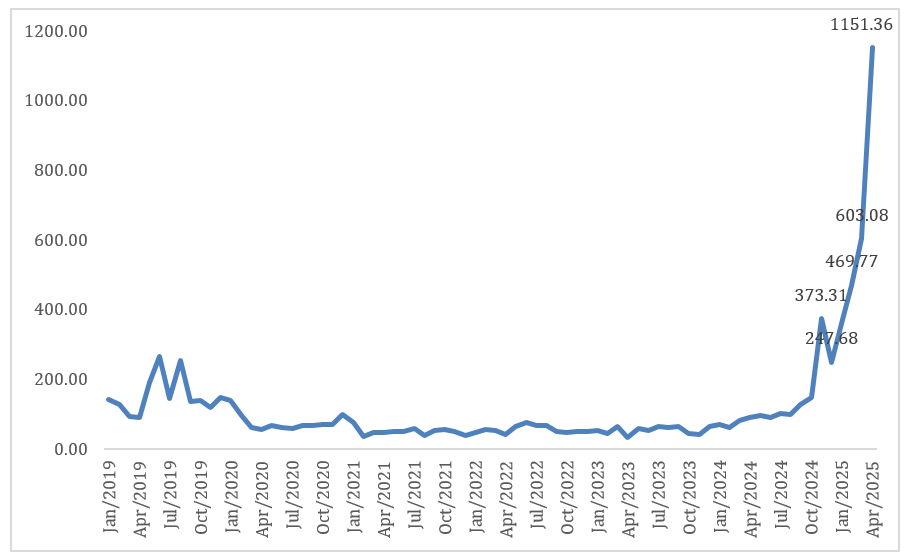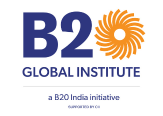Issue Brief
Thematic Area: Trade, Investment, and Resilient Supply Chains

Key Takeaways from Trade and Investment Issue Note of G20 South Africa
Introduction
In 2024, global trade reached new heights to reach USD 33 trillion, expanding by almost USD 1.2 trillion, with services trade increasing by USD 700 billion, and merchandise trade rising by USD 500 billion1 . The UNCTAD Trade Nowcasts provides a more recent outlook with quarter-over-quarter forecasts for trade. The model used by UNCTAD, updated on a weekly basis, provides predictions on trade outlook for the selected quarter. As on May 6, 2025, trade in merchandise values in quarter 2, 2025 is forecasted to expand by 2.06%2 .
South Africa’s presidency of the G20 Summit, which will be held in November 2025, comes at a time when the global economy is grappling with geopolitical headwinds and trade policy uncertainty. IMF expects global real GDP growth to drop from 3.0% in 2024 to 2.8% and 3.0% in 2025 and 2026, respectively, due to trade tensions and policy uncertainties3 .
In April 2025, the Trade Policy Uncertainty (TPU) index, which is based on frequency of articles that discusses TPU in several newspapers, increased to 1,151.36 from 603.08 in March 20254 . This suggests around 11.51 percent of all news articles discussed trade policy uncertainty, given that a value of 100 corresponds to 1% share of articles.
Monthly Trade Policy Uncertainty Index

Source: Caldara, Dario, Matteo Iacoviello, Patrick Molligo, Andrea Prestipino, and Andrea Raffo (2020),The Economic Effects of Trade Policy Uncertainty,"Journal of Monetary Economics, 109, pp.38-59. Note: Data downloaded from https://www.matteoiacoviello.com/tpu.html on May 03, 2025
The G20 Summit, under the theme “Solidarity, Equality, Sustainability” provides an opportunity for nations to come together to address such uncertainties related to trade policy. G20 South Africa’s emphasis on inclusive development, focussing on sustainability, economic diversification, green industrial growth, and robust supply chains, is critical for enhancing global cooperation and eliminate asymmetries. By building on the outcomes of previous presidencies, the G20 Summit 2025 aims to develop principles to realise the full potential of international trade to generate greater employment opportunities and promote inclusive growth.
In line with this, G20 South Africa proposed four priority issues under the Trade and Investment Working Group (TIWG) which will be central to the discussions at the Summit.
Priority 1: Trade and Inclusive Growth
In addition to trade policy uncertainty, challenges such as extreme weather events, energy insecurity, inadequate development finance, and rising government debt levels hinder the development process of developing countries.
Increasing globalisation trends have intensified income inequality across regions. Countries that underwent early industrialisation developed stronger manufacturing and export capabilities, which in turn increased income inequality within their economies, and heightened economic insecurity in developing and least developed countries.
At present, low carbon technology is driving the new industrial policy, with newly industrialised countries leading the production of low-carbon products and technologies. Countries in the Global North have invested heavily in decarbonisation strategies to support their industries in catching up to such economies and becoming globally competitive.
In line with this, the G20 Summit calls for greater cooperation to promote greater inclusive participation in global trade. The G20 members can address the following issues by developing a cooperation agenda with Africa5 .
- First, TIWG will deliberate ideas to not only promote participation of developing countries but also boost inclusive contribution of women and youth in trade.
- Second, role of G20 in supporting the implementation of African Continental Free Trade Area (AfCFTA).
- Third, enhancing developing countries integration into the global value chains, while strengthening and diversifying global supply chains.
Priority 2: G20 Principles on Responsive Trade and Investment Agenda to Address the Global Commons
In the present economic scenario, global trade is witnessing rise in trade measures to address climate change, which are likely to cause greater trade fragmentation. While the developing world is conflicted with financial inaccessibility to transition to low carbon technology, it is imperative to comprehensively discuss the prevention of spillover of such measures that leads to economic fragmentation. The G20 Summit through discussions and exchange of ideas can mitigate distortionary trade policies, while also building consensus in relation to climate change measures and avoidance of trade fragmentation.
Another challenge that developing countries face is the lack of access to digital technology which the TWIG can eliminate by ensuring a more inclusive, fair, and equitable digital infrastructure. While ensuring data regulation and governance, there is also a need to address welfare losses for regions affected by trade and climate change adjustment costs.
Further, global economy must utilise the learnings from COVID19 to build robust heath infrastructure. In this context, TIWG can promote discussions focused on enhancing access to pivotal medical tools and promoting equitable production.
Among other productive discussions, this priority area will cover the following pivotal issues.
- First, mitigating the threat of climate change, while addressing climate measures that are likely to lead to trade fragmentation.
- Second, designing of a comprehensive framework that bridges the sustainability gaps faced by developing countries through mobilisation of financial and technological resources.
- Third, emerging trends in the Investment Treaty Regime that can support a reform framework for addressing global challenges, particularly the energy transition.
- Fourth, role of trade in equitable production, with access to pivotal medical instruments that ensures preparation for future pandemics.
Priority 3: G20 Framework/Pledge on Green Industrialisation and Investments to Promote Sustainable Development
The emphasis on a just transition through gradual phasing out of non-renewable forms of energy such as fossil fuels, should be in conjunction with a broader framework that also accounts for inclusive industrialisation, especially in developing countries. The said framework can promote investment mobilisation, technology transfer, and a diversified resource endowment that supports green transition.
Not only is the use of fossil fuels delinked with a comprehensive strategy, the share of manufacturing value addition in GDP for Sub-Saharan economies has been falling from the past two decades, recovering recently from its lowest levels in 2011.
In this context, green industrialisation presents a unique opportunity, especially for developing countries, to leverage their strengths and to enhance their participation in green industrialisation global value-chains.
To realise these objectives, the G20 Summit will establish a G20 Framework on Inclusive Green Industrialisation, with the following expected deliverables through discussions and the exchange of ideas.
- First, defining of a grand bargain to capture mutual benefits from green industrialisation. Determining key elements of the grand bargain will be focal points of discussion during the Summit.
- Second, role of G20 in deepening the participation of developing countries in green global value chains and supporting diversification of green industries.
Priority 4: WTO Reform
Another priority during the G20 Summit is reforming of World Trade Organization (WTO). There is a need to streamline and balance the interests of developing countries by developing more policy space to adopt policy tools that further deepens industrialisation.
Market distortions in global agricultural trade are exacerbated by large number of nontariff measures (NTMs) that restricts trade. Thus, the G20 statement on WTO include the following areas for discussion.
- First, focused outcomes on WTO reform in 14th Ministerial Conference (MC14).
- Second, enhance the development dimension of WTO to address challenges in global economic development.
- Third, member nations will also discuss global food security challenges to take negotiations for agricultural trade reform forward.
- Fourth, draw global consensus to ensure the smooth functioning of a dispute settlement system.
Conclusion
Even though there has been an increase in trade policy uncertainty, the G20 principle on trade and inclusivity, in addition to the Africa Cooperation Agenda, will transcend physical boundaries to establish deeper cooperation amongst G20 nations, especially in enhancing the interests of the developing world.
From a global common perspective, G20 Principles for Trade and Investment will be pivotal in eliminating distortionary trade policy, building fair and inclusive digital infrastructure, among other common priorities in the developing world. The G20 framework on green industrialisation and investments will promote linkages between green transition and an inclusive industrialisation strategy, while the WTO statement on the development dimension will bring more balance to WTO rules leading to greater economic prosperity in developing countries.
Click here to read the complete issue note under the sherpa track of G20 South Africa 2025.
